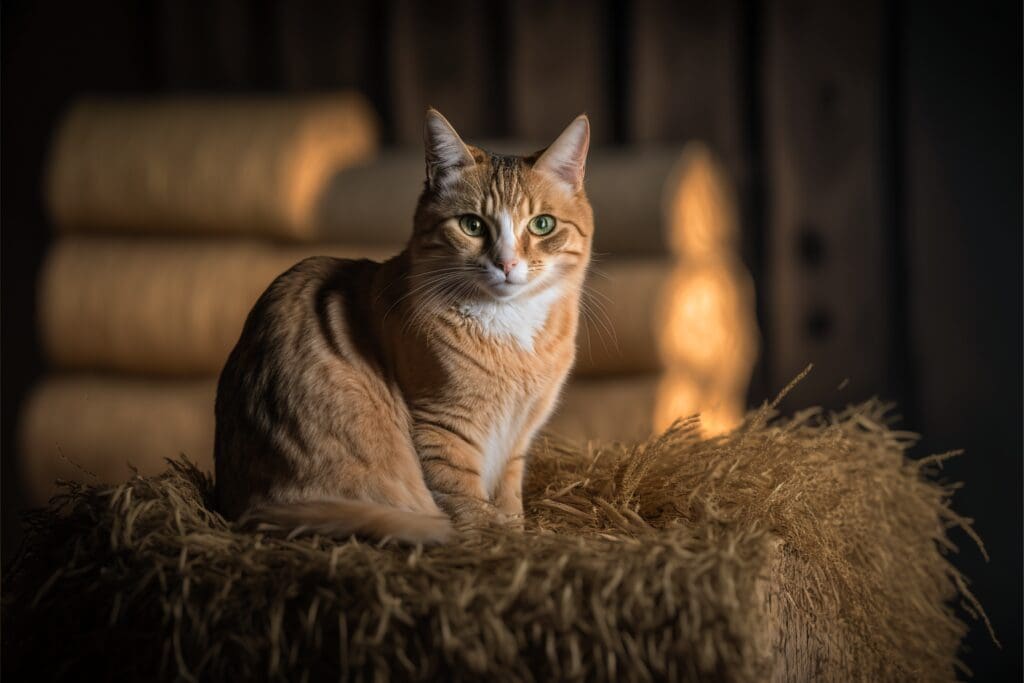Last Updated on January 6, 2023 by admin
The answer is yes, cats can eat hay in moderation. Hay is not toxic and can provide some benefits to cats, such as helping them keep their teeth clean. However, it is important to keep in mind that cats are obligate carnivores and hay does not provide them with any nutritional value. Therefore, hay should not be a regular part of their diet. If you have other pets that eat hay like rabbits and you notice your cat eating their hay you might want to figure out ways to limit the cat’s access to your hay. It’s mostly harmless but you might notice your cat vomiting more often due to hay consumption.
The Benefits of Hay for Cats
Hay can be beneficial for cats in a few ways. It can help to keep their teeth clean by providing a natural form of chewable material. It also helps to provide extra fiber, which helps to keep their digestive system healthy. Furthermore, some cats may enjoy the taste and texture of hay. However, eating hay might induce your cat to vomit more frequently and might hamper nutrient absorption from their regular diet. If your cat is regularly eating hay despite your best efforts you might want to consult your veterinarian to see if your cat has other health issues.
What Is Hay?
Hay is a type of grass that is dried and used as feed for livestock and horses. It is composed of stems, leaves and flowers, and is a natural source of fiber. It is sometimes referred to as “haylage” or “straw”. Hay is generally safe for cats, although it should not be their primary source of nutrition as they are obligate carnivores. When feeding hay to cats, look for hay that is free of mold, dust and pesticides. In addition, it should be stored in a cool, dry place away from direct sunlight. When purchasing hay for cats, make sure to read the labels carefully to ensure that it is safe for them to consume.
Types of Hay
Hay can come in a variety of types, including timothy, orchard, and meadow hay. Timothy hay is the most common type of hay for cats, as it is high in fiber and low in protein and calcium. Orchard hay is also high in fiber, but it is a bit higher in protein and calcium than timothy hay. Meadow hay is usually higher in protein and calcium than the other two types of hay, but it is also less fibrous. When choosing hay, it is important to make sure that it is fresh and free of mold or other contaminants. Since cats are obligate carnivores there is no need to give them hay. However if you have other pets like rabbits or guinea pigs that eat hay your cat may start eating hay occasionally. As long as it isn’t causing other issues like frequent vomiting it usually isn’t a problem. However you may want to figure out ways to limit your cat’s access to hay so they can stick to an appropriate diet.
What to Look For When Buying Hay
Look for hay that is green and free from mold or dust. Also, make sure to check the packaging for expiration dates and storage instructions. If you’re buying hay in bulk, you’ll want to inspect it closely for any obvious signs of spoilage. You should also make sure that the hay is free of any foreign objects like twigs, rocks, or dirt.
How to Store Hay Safely
Hay needs to be kept in a dry place away from direct sunlight and moisture to ensure that it stays fresh. It’s also important to keep the hay away from rodents and other pests that might be attracted to it. If you keep hay in a pet-proof container, it should stay safe and dry for weeks or even months. After opening the container, make sure to keep an eye on the expiration date and replace the hay if necessary.
Dangers of Feeding Hay to Cats
It is important to note that hay should not be given to cats in excess as it can lead to an upset stomach, diarrhea, nausea, and/or vomiting. Therefore, it is best to provide hay in moderation and as part of a balanced diet. Additionally, it is important to ensure that the hay you are giving your cat is safe and free from dust, mold, and other contaminants. If your cat is showing any signs of discomfort after consuming hay, it is best to contact your veterinarian immediately.
Can Kittens Eat Hay?
While hay is not toxic for cats, it is not recommended for kittens. Kittens need a more balanced diet of wet and dry food to get the proper nutrients they need to develop and grow. If you do decide to give hay to your kitten, make sure it is good quality hay and only in small amounts. Monitor your kitten for any digestive issues or changes in appetite when introducing hay into their diet.
